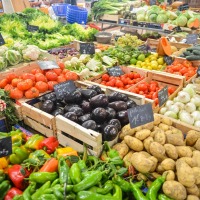

Farming is a Major Polluter

Even though agriculture is an essential part of human civilization, did you know that it is also a major contributor to environmental damage?
Farming was designed to provide us our basic necessities such as food, clothing, shelter and medication to enhance our civilization. However, intense farming and unsustainable farming methods can be damaging to our environment and are a threat to our existence. Because of this, implementing sustainable methods of farming is necessary to ensure the least amount of impact on the environment.
Agriculture is one of the oldest practices of human civilization. It goes back to the days when we started to transition from being hunters and gatherers to food producers and growers. Agriculture was meant to sustain and enhance human civilization, allowing people to stay in one place and build a civilization around a fertile land with a suitable environment and abundant resources.
Growing food comes with a price tag.
Does animal farming impact the environment?
 When we grow food for ourselves, we use a huge amount of resources. We generally use land, water, air, soil, fuel, power and chemicals in order to grow crops and raise animals on our fields. As a result, a large number of forests are being cut down, fuel is burned and water is wasted. All this resource wastage impacts the environment.
When we grow food for ourselves, we use a huge amount of resources. We generally use land, water, air, soil, fuel, power and chemicals in order to grow crops and raise animals on our fields. As a result, a large number of forests are being cut down, fuel is burned and water is wasted. All this resource wastage impacts the environment.
Many farmers use synthetic fertilizers, pesticides, herbicides, antibiotics and so on for controlling animal health and pasture management. In other words, there is a huge array of resources involved with agriculture that can impact the globe.
A new study shows that livestock production may have a bigger impact on the planet than anything else. Farms are also one of the major contributors of greenhouse gases. They produce several of the greenhouse gases such as methane, nitrous oxide, and carbon dioxide. According to fao.org, the FAO ( Food and Agriculture Organization) estimates that 18% of human-caused greenhouse gases are from animal farms.
Using our resources efficiently and managing our farms can minimize global impacts and reduce greenhouse gases.
There are several factors involved with farming that may influence the amount of greenhouse gases and environmental impacts of farming. Factors like how you feed your animals, manage your pasture and manage your soil can all affect the environment.
Environmental impacts of unsustainable agriculture:
- Water contamination
- Soil degradation
- Habitat loss
- Air pollution
- Global warming
- Impact on biodiversity
The solution
Efficient use of natural resources and organic farming methods will make the least impact on the environment. A wide range of factors needs to be taken into account to maximize production and minimize waste.
Factors that influence farm production:
- Pasture management
- Soil management
- Water management
- Organic fertilizers
- Responsible use of chemicals and pesticides
- Fuel and resource management
- Efficient feed management
 It is estimated that 70% of all agricultural land is used for livestock farming. There is a huge number of animals being raised on these farms and they emit several greenhouse gases. Additional land and resources are also needed to grow animal feed. Imagine the impact that more sustainable practices could have.
It is estimated that 70% of all agricultural land is used for livestock farming. There is a huge number of animals being raised on these farms and they emit several greenhouse gases. Additional land and resources are also needed to grow animal feed. Imagine the impact that more sustainable practices could have.
“Unsustainable agricultural and aquaculture practices present the greatest immediate threat to species and ecosystems around the world.” – WWF – Environmental impacts of farming
Conclusion
It is important that we understand what causes global impacts and how to minimize our affect on the environment. We must manage all of our resources and use them efficiently.
It is possible to grow food and raise animals using sustainable and organic methods, without the use of toxic chemicals and with minimum pollution.
The purpose of agriculture was to sustain and enhance human civilization on the globe. That is exactly what we should all aim to do.
If you would like to learn more about sustainable agriculture or to learn about DIY sustainable feeding systems please contact us at 303-495-3705 or Click here to book a meeting with us.
We’d love to hear from you, so please visit our Facebook Page and leave your comment there. We’d also appreciate it if you leave your comment in the comment box below.
Source: Sustainable Livestock Nutrition
Related articles and resources:
- Cattle Management -5 Tips for Winter | Sustainable Livestock Nutrition
- What to feed Your Cattle Herd During the Cold Winter? | Sustainable Livestock Nutrition
- WWF – Environmental impacts of farming
- PSEP :: Fact sheets :: Modern Agriculture: Its Effects on the Environment
- New Study Shows the Major Environmental Impact of Meat Production | TIME.com
- Leading Cattle in Pasture & Rotational Grazing | Sustainable Livestock Nutrition







